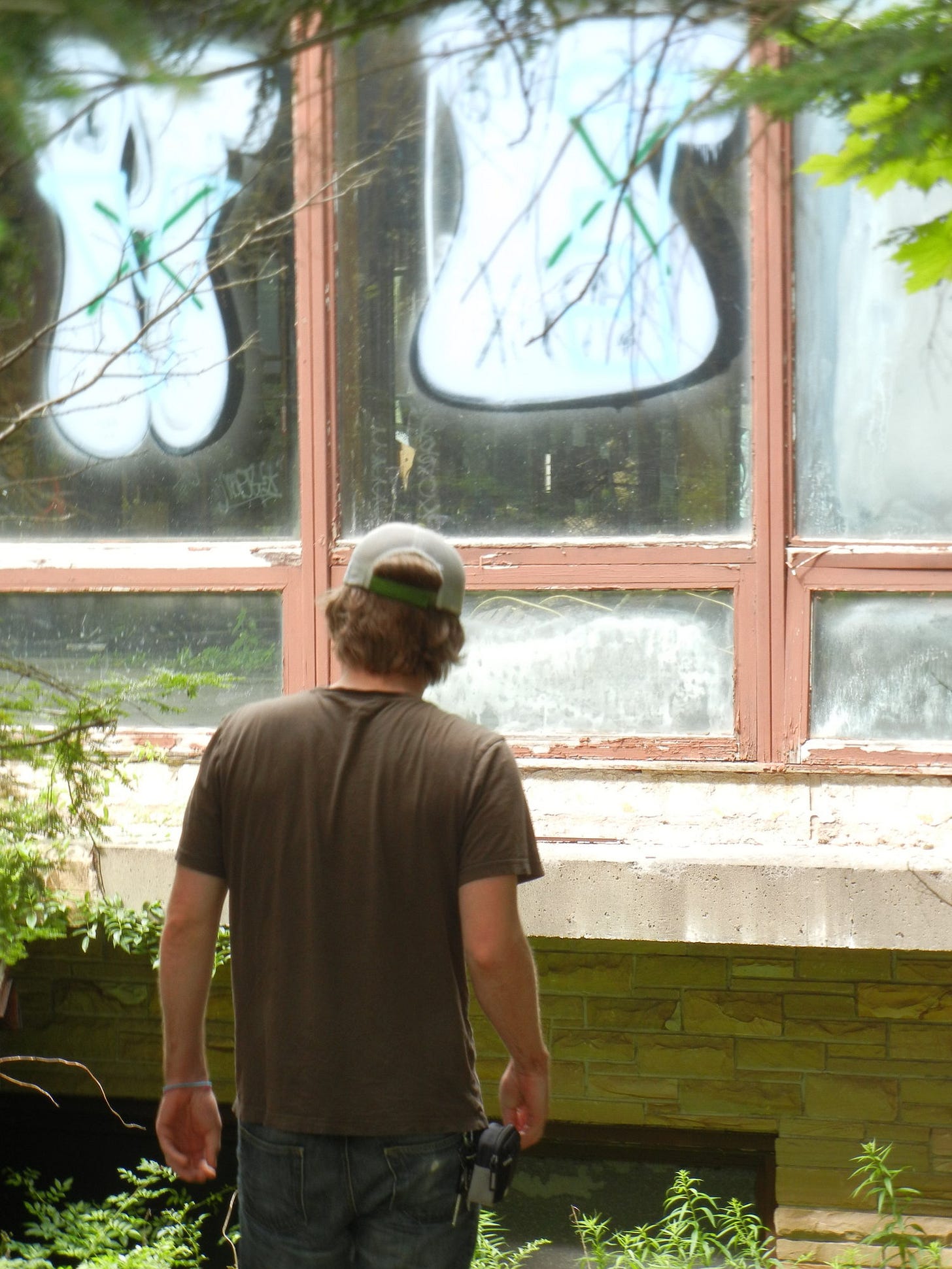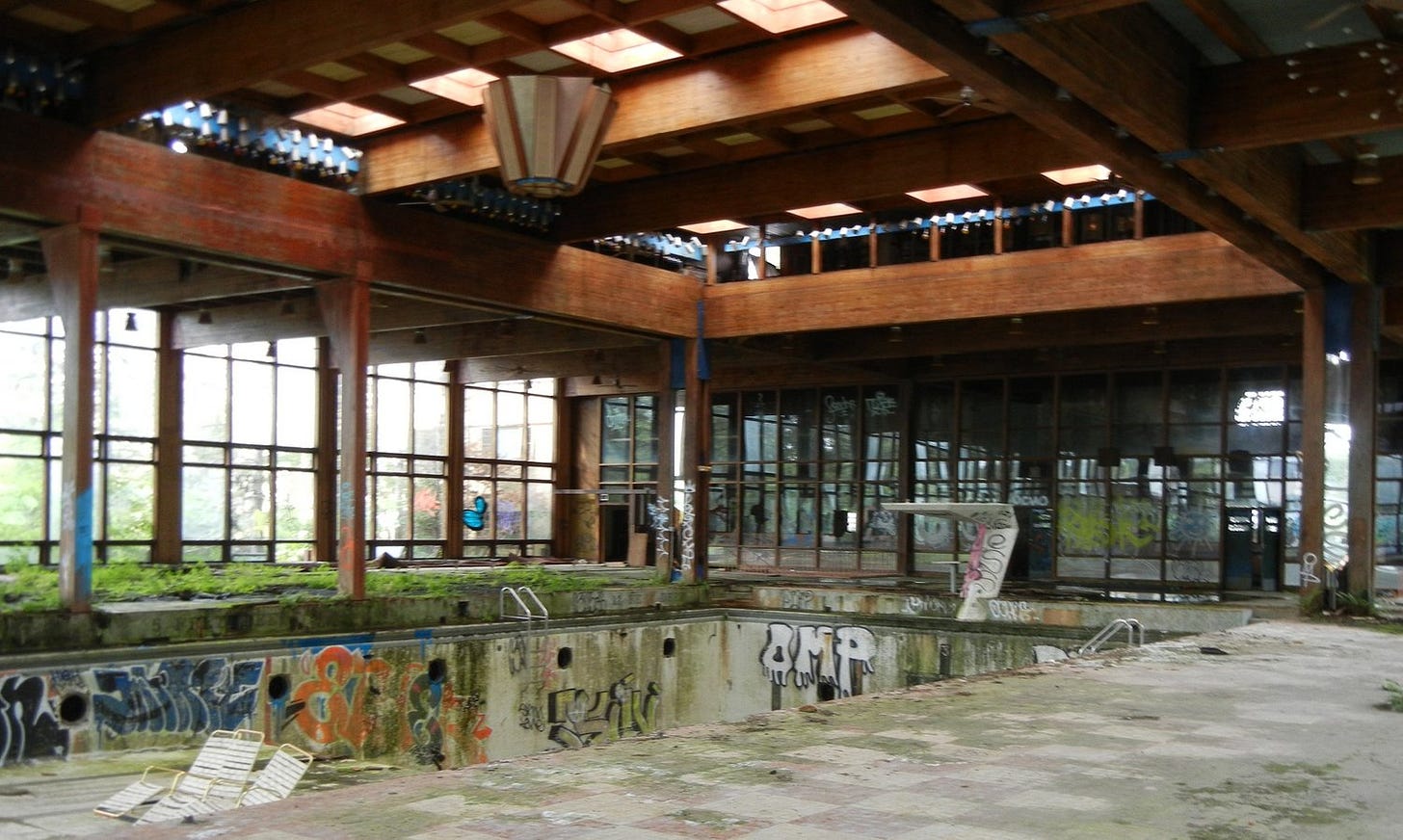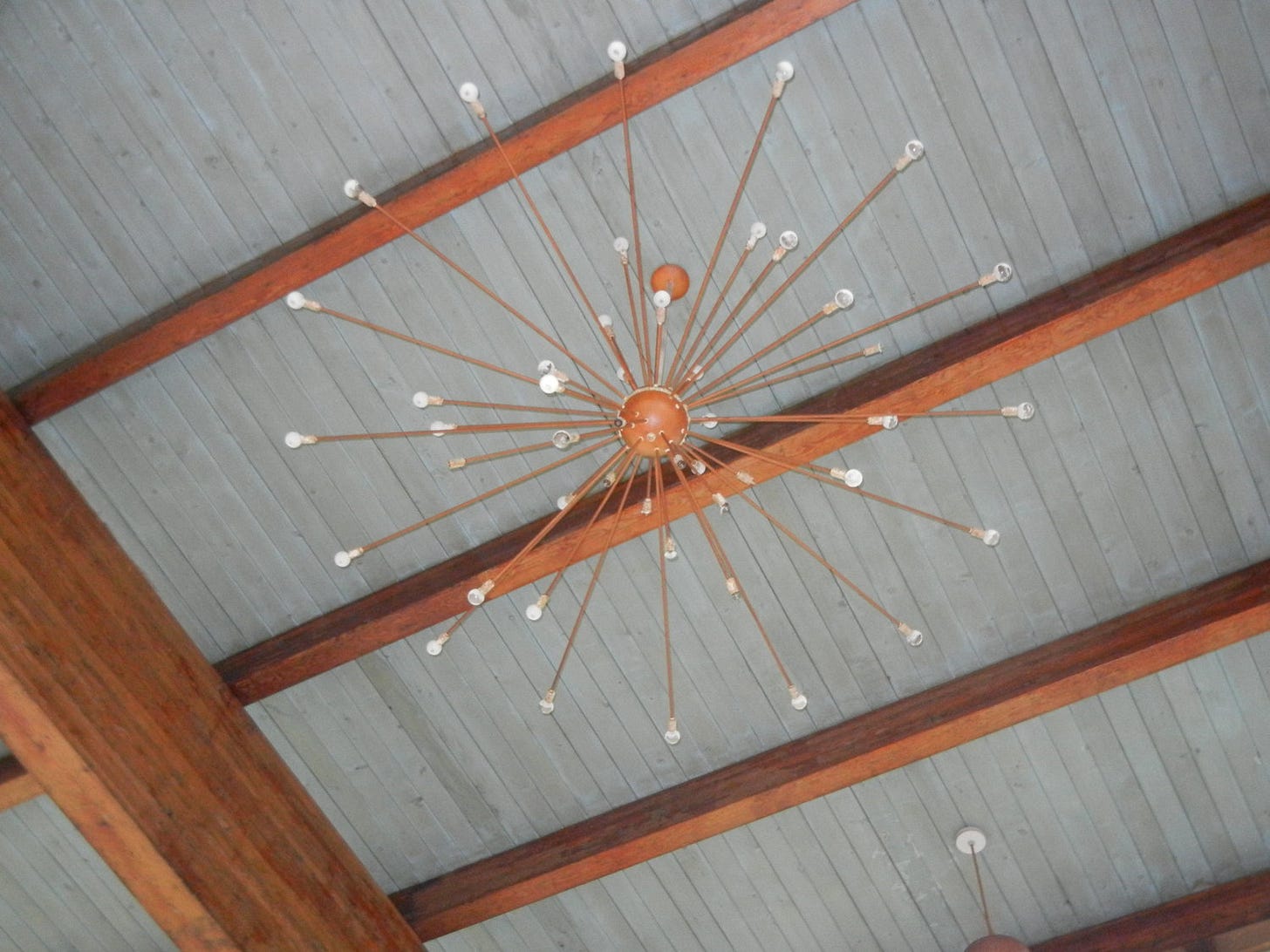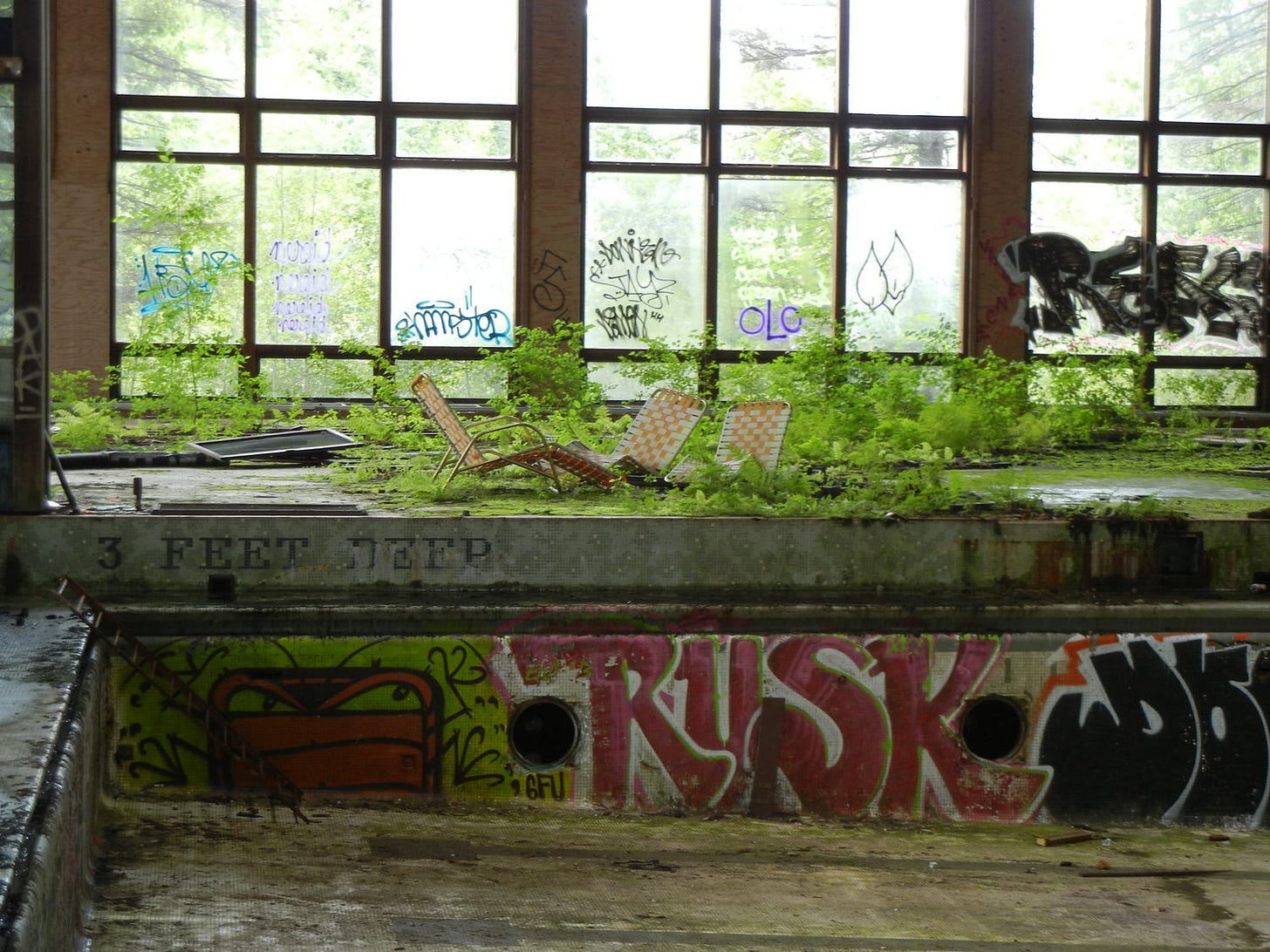Being There
Adam O'Fallon Price Takes In Person Research to a New Level
Hey there, Complete Workers. One reason why I started this newsletter is that I was very excited to feature other writers talking about their process and how their work develops. That interest grew in part out of a story that today’s writer, Adam O’Fallon Price, told me once, so I invited him to share it with all of you. Adam’s short fiction has appeared in Harper’s Magazine, The Paris Review, Granta, VICE, and many other places, and his essays and criticism regularly appear in The Paris Review Daily, Ploughshares, Electric Literature, and The Millions, where he's a staff writer. He’s also a wildly talented novelist! His first novel, The Grand Tour, is a road trip like no other, and his second novel, The Hotel Neversink, won the 2020 Edgar Award for Best Paperback Original. It’s a mystery! It’s a novel in stories! It’s a surprisingly compact epic that takes us through the rise and fall of the Borscht Belt with both page-turning vigor and real depth! You should read it, is what I’m saying. And below, you’ll learn a bit about how Adam researched the fictional Catskills resort that forms the novel’s setting.
Being There
by Adam O’Fallon Price
When people ask about the genesis of The Hotel Neversink, I usually mention something about breaking into Grossinger’s Catskills Resort, the legendary hotel on which my novel’s titular hotel was based. I had been working on the project for several months, had drafted several chapters inspired by some of the stories an older friend and longtime Catskills visitor had shared with me. Despite the relative proximity of the Catskills to where we lived at the time in Ithaca, New York, I hadn’t really considered visiting one of the old, crumbling hotels; I’d never done that kind of on-location research before and didn’t really see the point. But I had time off during that summer, and it was beautiful weather for a daytrip—I’d done some reading about how easy it was to get into the hotel, and I figured why not?
“Breaking in” is honestly a lot grander than what my wife and I did that April afternoon. By that point, in 2015, Grossinger’s had long since closed, but the hotel’s venerable golf course remained operational. To ward away curious looky-loos exactly like us—not to mention drug addicts and the homeless—the golf course had a security guard in their employ. I never saw them in person, but the black SUV sitting on a small hillock overlooking the hotel sent an unmistakable message. We loitered around in front of the place, taking pictures and poking around, then moseyed around the side, ducked behind the trees lining the building, and scrambled up through the busted-out windows of the natatorium—the indoors swimming pool that was famously once the largest in the country.
This space was enormous, cathedral like, with a concrete swimming pool and molded concrete diving board, and hand-carved wooden art deco chandeliers overhead. The room had been extensively graffitied, and some of the graffiti was quite beautiful; it also bore the marks of occupation, by both transients and bored adolescents: an unspeakable mattress in a far corner and glass forty bottles everywhere. In the bottom of the long-drained pool were a couple of deck chairs, a scummy puddle of stagnant green water, and an inexplicable pile of shoes. At the head of the natatorium, past a line that would previously have been demarcated by doors, was a space where the front desk had been, the literal outline of the great mantle and its former wooden shelves still visible. To the right was the original massive, heavy oak door, into which people had carved various initials and obscenities. And down the hall were rooms, many darkened rooms into which we could not bring ourselves to poke. The pool and lobby would have to suffice.
The visit had an immediate, profound impact on me, and I found myself surprised by that fact. Surprised because, as I said, I’d never really considered myself an on-location type. To the contrary, for fiction writers, I’d always thought it was a little self-conscious and precious, a little bit performative. It seemed like something writers do to seem serious—for instance, Philipp Meyer hunting deer with a bow and arrow and drinking buffalo blood in his research for The Son. I loved the story about Laurence Olivier scoffing at Dustin Hoffman’s rigorous method routine on the set of Marathon Man—after learning Hoffman had stayed up three days because his character had, Olivier said, “Why don’t you just try acting?” I admired the dedication of some writers on this front, but I’ve never held fiction to any serious standard of factuality, nor, to my knowledge, had I ever really enjoyed a novel more or less for being extremely well-researched.
I found, however, that long after we had visited Grossinger’s—after we’d returned to Ithaca, and later, after we’d left upstate for Iowa City—I thought about it. But “thought” isn’t really the right word. As I continued working on the novel, I was transported back to that April afternoon again and again, as though the spirit of the hotel had leeched into my pores during our little incursion. I had seen precious little of the actual hotel: natatorium, entryway, lobby, the long hall presumably leading to the dining and ballrooms. Some of these images, these details and spatial positions, appeared in the novel, but what really made a difference was my felt sense of the place and the emotional experience of being there.
I’ve never believed in ghosts, and even find the idea of places having “auras” to be a bit suspect—generally speaking, I’m a materialist to a fault—but Grossinger’s had an aura, and something as near to ghosts living there as I could imagine. The history of the Jewish-American twentieth-century—hopeful, brutal immigration; World War Two and the Holocaust; the post-war boom; the malaise of the seventies—hung in that space with a tangible weight, and the sense of existing out of time was manifest. And as desolate as it was in 2014, it was quite easy to imagine it filled with people: with kids splashing in the pool; with harried waiters; with guests piling suitcases through the large entrance. This mass of spirits formed an immediate backdrop, both in my mental landscape of the hotel and in the backdrop of characters that would come to form its human fabric.
But there was something even beyond that. The most important aspect of that minor bit of field research was something I only really came to understand over the course of drafting the entire novel, something ineffable about how the mind and ego and imagination work. Namely, that your brain processes things differently if you’ve been somewhere. Before I’d been to Grossinger’s, I had a washy imagined version of the hotel that adhered fairly closely to the actual, given the amount of old Catskills photos available on the internet. I had a sense of the place, but having never been there myself, it did not seem fully real. We were only there for a couple of hours, but something about physically occupying a place seems to work a kind of magic. Again, I say this as someone who doesn’t believe in magic, literary or otherwise—but the project suddenly felt three-dimensional.
I don’t necessarily believe this is a universal response—there really are no universal responses in writing—and yet demonstrably an enormous number of writers feel the need to geographically go to the place they’re writing about. What I’ve come to think about this, and related phenomena, is that writing is a high-level intellectual activity undertaken by a race of beings who are mostly still governed by primitive instincts. We are not so long as a species out of the cave, fashioning narrative out of clashes with other tribes and animals as the fire flickers before us. Being able to tell a story—feeling allowed, even—often involves, on a curiously literal level, involving ourselves in the narrative, however tenuously. Physical presence implicates you in the historical fact, however passingly. The animal brain can then allow the imagination to more freely do its work.




